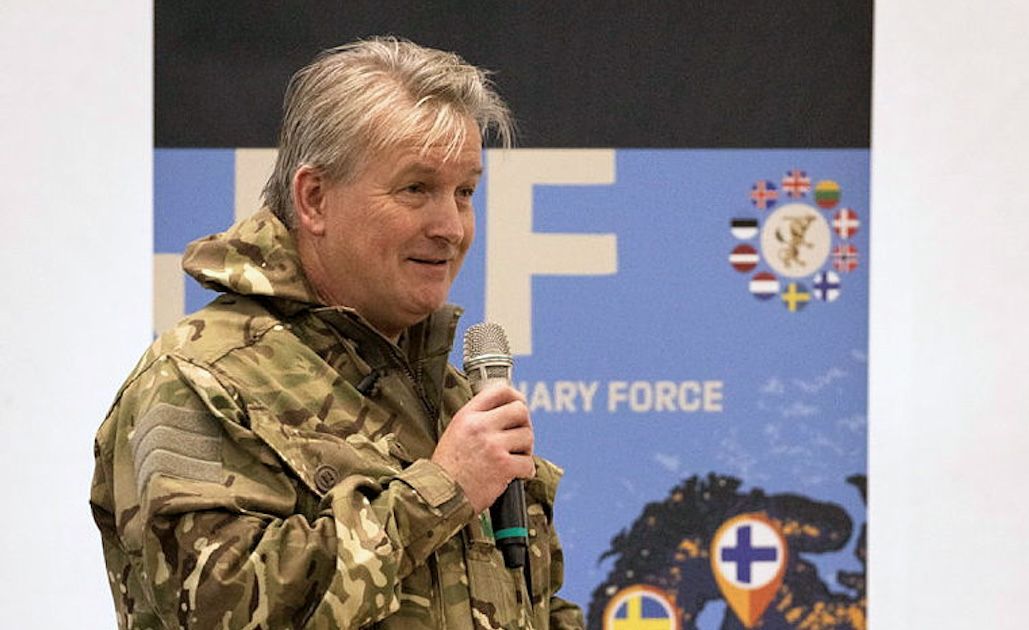Alexander Martin

Gen. Sir Jim Hockenhull, the head of Britain’s Strategic Command — responsible for the Ministry of Defence’s offensive and defensive cyber capabilities — is warning “we are now in the most dangerous time I can remember in any point of my career.”
Speaking as the full-blown Russian invasion of Ukraine enters a third year, amid conflicts in the Middle East and threats to Western critical infrastructure linked to prepositioning around a potential Chinese invasion of Taiwan, Hockenhull stressed: “That’s not to say that war is either inevitable or imminent. But I think we’re in a different period now.”
This new period demands change in “how we think about national security,” said the four-star, broadening the circle — particularly in the cyber and electromagnetic domain — to bring in industry, academia and international partners without the “traditional, transactional, contractual set of relationships.”
“I truly believe that if things are changing in the world, and it is getting more dangerous and darker, our responsibility is to respond to that and adapt,” said Hockenhull in a speech that was published Friday by the MoD, and originally delivered in London last week.
While the vast majority of the British Armed Forces are “preparing and exercising for conflict, or supporting and conducting operations,” their cyber operators are “on the frontline with our adversaries every single day, and every single night, and every single weekend. This is a 24/7, 365 days a year operation.”
But, he warned, there is a dramatic shortage “of the types of skills that we need for people to have in the cyber and electromagnetic domain.”
His comments came just weeks after several senior and former officials lamented the current state of the British military, with troop levels now at their lowest for 200 years, and amid suggestions that conscription would be necessary in the event of war.
Hockenhull said: “Notwithstanding the nature of the threat that we face today, the first battle of the next war is the battle for talent, particularly the battle for digital talent. I would assess at the moment that we are losing that battle.”
Cyber personnel could be treated differently to those in other military positions: “It’s very difficult to imagine recruiting someone to be an armored brigade commander who’s previously been running a business outside, but I absolutely can see someone who’s going to be commander or a fundamental element of our senior echelon in the cyber and electromagnetic domain, who has been able to gain experience in the wider economy.”
Ukraine now the global center of electronic warfare
Kaliningrad, the Russian exclave on the Baltic Sea between Poland and Lithuania, has historically been a hotbed for the Kremlin’s electronic warfare capabilities. In particular, analysts have identified a complex of systems known as Tobol that has allegedly been used to suppress GPS signals near the region in recent months.
“When I used to look at the challenge of Kaliningrad and the network of sensors and electronic defenses that were based around Kaliningrad, this is nothing compared to what Russia has deployed on its frontline in Ukraine,” said Hockenhull.
He cited a study by the Royal United Services Institute analyzing how strikes using U.S.-made guided bombs known as Joint Direct Attack Munitions (JDAMs) were being foiled by Russian GPS jamming in Ukraine.
The study suggested around 10,000 drones a month were “failing to operate effectively and potentially being destroyed as a consequence of the challenge of operating in that densely packed electronic environment,” said the general.
Russian forces in Ukraine have deployed approximately one significant piece of electronic warfare equipment for every 10 kilometers of frontline, he added.
Two decades of deployment in Iraq and Afghanistan meant the British military largely moved away from focusing on capabilities in the electromagnetic domain. “There were some niche elements of electronic warfare that we deployed, but this is a different scale and a different type of challenge,” said Hockenhull.
Russia’s capabilities, if not protected against, could make uncrewed systems “worthless’ as well as guided missiles and rockets which can be “prevented from having the effect that they would expect.”
The Kremlin’s cyberattacks targeting critical national infrastructure in Ukraine “is having a cognitive effect on the population, in the same way that bombing power stations does,” said the general.
These attacks haven’t stopped in recent months, he noted, citing the attack on Kyivstar, which didn’t necessarily have an impact on the Ukrainian war effort, but attempted to “shock the population about what could be done to things that they would routinely expect to be available to them.”
“There are some stories that can be told of cyberattacks which have been launched and have had impact, but I struggle to see ones that have had decisive impact,” said Hockenhull. “This is where we’ve got to be really smart about how we integrate the cyber and electromagnetic domain with others.”
Part of the challenge is that “we tend to do our cyber and electromagnetic work in compartments or under the cloak of high degrees of secrecy,” which doesn’t contribute to integration.
“How do we provide military commanders assurance that the capabilities that are offered to them are going to be there, at the right place, at the right time for them to be integrated into their plans?” he asked.
Without that level of assurance, “cyber and electromagnetic activity will always be added at the last moment and will never be fully exploited or integrated.”
Getting this integration right is critical, said Hockenhull. “This is about seizing opportunities,” he said. “It’s easy to make some remarks around this, delivery is much more difficult. We have to do this together because if we don’t then the sorts of threats which are out there are going to be so much more difficult to confront.”
No comments:
Post a Comment